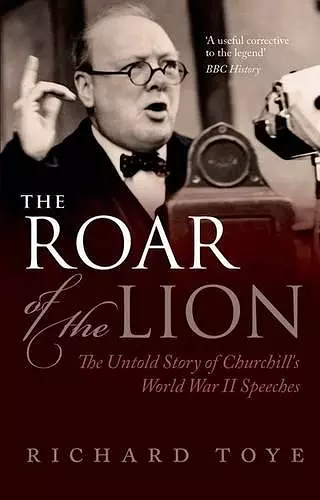The Roar of the Lion
The Untold Story of Churchill's World War II Speeches
Format:Paperback
Publisher:Oxford University Press
Published:5th Feb '15
Currently unavailable, and unfortunately no date known when it will be back

''My aunt, listening to the Prime Minister's speech, remarked of "our greatest orator", "He's no speaker, is he?"' -diary of teacher M.A. Pratt, 11 Nov. 1942. The popular story of Churchill's war-time rhetoric is a simple one: the British people were energized and inspired by his speeches, which were almost universally admired and played an important role in the ultimate victory over Nazi Germany. Richard Toye now re-examines this accepted national story - and gives it a radical new spin. Using survey evidence and the diaries of ordinary people, he shows how reactions to Churchill's speeches at the time were often very different from what we have always been led to expect. His first speeches as Prime Minister in the dark days of 1940 were by no means universally acclaimed - indeed, many people thought that he was drunk during his famous 'finest hour' broadcast - and there is little evidence that they made a decisive difference to the British people's will to fight on. In actual fact, as Toye shows, mass enthusiasm sat side-by-side with considerable criticism and dissent from ordinary people. Yes, there were speeches that stimulated, invigorated, and excited many. But there were also speeches which caused depression and disappointment in many others, and which sometimes led to workplace or family arguments. Yet this more complex reality has been consistently obscured from the historical record by the overwhelming power of a treasured national myth. The first systematic, archive based examination of Churchill's World War II rhetoric as a whole, The Roar of the Lion considers his oratory not merely as a series of 'great speeches', but as calculated political interventions which had diplomatic repercussions far beyond the effect on the morale of listeners in Britain. Considering his failures as well as his successes, the book moves beyond the purely celebratory tone of much of the existing literature. It offers new insight into how the speeches were written and delivered - and shows how Churchill's words were received at home, amongst allies and neutrals, and within enemy and occupied countries. This is the essential book on Churchill's war-time speeches. It presents us with a dramatically new take on the politics of the 1940s - one that will change the way we think about Churchill's oratory forever.
Richard Toye's detailed and thoughtful exercise in listener reception is ... both overdue and highly welcome. * Journal of Modern History *
I never expected even to like this book, never mind nominate it as one of my paperback reads of the year. But it's possibly one of the most surprising histories I've ever read ... Essential reading. * Lesley McDowell, Paperbacks of the Year 2015, Independent on Sunday *
The evidence is rich and varied, but the genius of Churchill's wartime writing shines through. * Good Book Guide, Fiona Lafferty *
Thoroughly researched, readable and fascinating. * David Reynolds, The Guardian *
[Richard Toye] provides a nuanced and discriminating account of the pivotal episode in Churchill's career. * Peter Clarke, Financial Times *
The Roar of the Lion is a thoughtful and thought-provoking book. * Richard Overy, Times Literary Supplement *
Toye writes lucidly, and there is no sense of repetition in the book, which forensically examines one speech after another... [There] are still a lot of new aspects of Churchill's life to be explored. Toye has found one with this first ever, comprehensive, archival based study of WSC's splendid wartime speeches. * History Today *
The book explores enemy and neutral responses, as well as how the speeches were written. In doing so, it offers a nuanced portrait of a key facet of Churchill's war leadership. * Gary Sheffield, BBC History Magazine Books of the Year 2013 *
The main strength of The Roar of the Lion lies in its patiently researched microhistories of the speeches. Toye pinpoints the contexts in which they were written, the calculations that lay behind them, and their reception not just at home but also overseas. * Literary Review *
[Toye is] one of Britain's leading historians and a man sympathetic to, but not subsumed by, the Churchill of lore and yore. * Boston Globe *
Thought-provoking ... a useful corrective to the legend. Not only was there a larger variety of responses to Churchill's oratory than usually imagined, but sometimes Churchill's speeches actually depressed, rather than exhilarated. Nor did praise for his wartime oratory mean that people thought Churchill would be the best person to lead the nation after victory, as the 1945 election showed. Good military news, as Toye's evidence makes clear, was always a more invigorating tonic than the most inspirational rhetoric. * David Stafford, BBC History magazine *
Toye's analysis of audience figures and personal diaries provides a fascinating insight into how the British public received Churchill's now much revered wartime speeches. * Discover Your History magazine *
The details make this book a joy to read for speakers and speechwriters alike. * Denise Graveline, Eloquent Woman *
The Roar of the Lion is a valuable addition to the study of Churchills wartime premiership and demonstrates that there is still much to say about the man and his work. * Kevin Matthews, Reviews in History, 14/04/2014 *
Toye weaves all this skillfully together to provide the most nuanced assessment yet of the impact of Churchill's rhetoric.[...] Highly recommended. * R. A. Callahan,Choice *
ISBN: 9780198715450
Dimensions: 215mm x 135mm x 24mm
Weight: 400g
320 pages